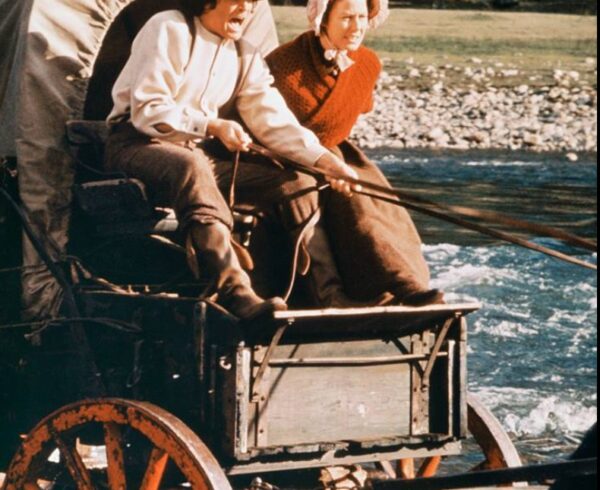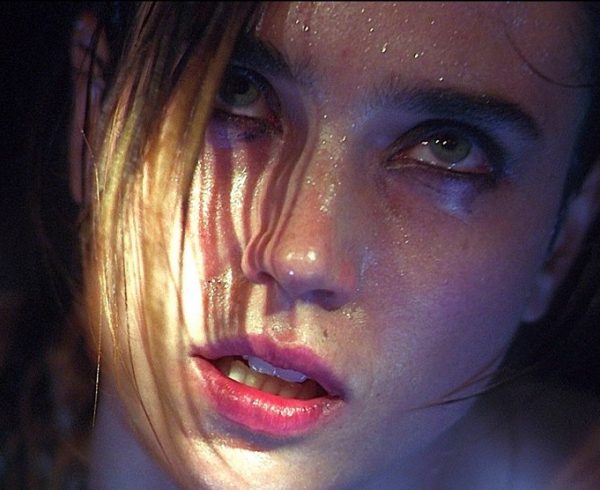Cutting demonic deals in order to make it big in Hollywood isn’t really a new idea. In fact, way back in 1968’s Rosemary’s Baby, the character of Guy Woodhouse went so far as to cuckold himself to Old Scratch just for the opportunity to land a good role. These days, if pressed, I’m sure most of us could name ten or more real life actors whose celebrity is so inexplicable that their successful careers can only be attributed to the diabolic (or perhaps Scientology if you believe there’s any real difference between the two). The writing/directing team of Dennis Widmyer and Kevin Kolsch must have been thinking along those same lines when they crafted Starry Eyes, a surprisingly good take on the well-worn ‘sign in blood on the dotted line’ tale.
Starry Eyes follows aspiring actress Sarah (Alex Essoe in what should be a breakout role) as she spends her days working a thankless job waitressing at Big Taters (think Hooters, but with spud-colored tights instead of orange short-shorts) and her evenings hanging out with friends, some of whom passive-aggressively undermine her attempts at stardom. Things look bleak until Sarah attends an audition for a new horror film being produced by the legendary production company, Astraeus Pictures. To save you a trip to Wikipedia, we’ll go ahead and tell you up front that in Greek mythology, Astraeus was the pre-Olympian god of the dusk who fathered the four winds.
After flubbing the audition, Sarah retreats to the restroom where she succumbs to a bout of trichotillomania, an obsessive-compulsive disorder whose sufferers release stress by pulling out their own hair. Fascinated by the actress’ breakdown, the casting director invites Sarah back in and insists she repeat the traumatic episode in front of everyone. Though humiliating, this ultimately garners Sarah a callback for a second audition, and it’s here that things begin to get weird.
Although the role doesn’t call for nudity, the casting director demands Sarah disrobe as a sign that she is willing to do whatever is necessary to open herself up and transform for the production. Sarah acquiesces, reluctantly at first, but as the cameras snap picture after picture, she enters into an ecstatic trance-like state, much to the creepy satisfaction of the casting director whom we now see is wearing a pendant bearing the symbol of Astraeus. It’s our first confirmation that Sarah is being groomed by a cult who wants more from her than just a performance.
Upon leaving the audition, Sarah’s personality slowly begins to alter. When one of her friends slips by the pool and breaks her nose, the usually demure Sarah openly laughs at the girl’s pain. Worse, after she goes back for more auditions, one of which requires her to submit to a paganistic variation of the casting couch while hooded cultists lurk in the background, Sarah’s body begins to physically reflect the sickness spreading in her soul.
Up until this point, the movie has relied on a slowly simmering stew of psychological uneasiness to generate chills. The filmmakers were obviously weaned on the likes of Dario Argento and David Lynch and they put those influences to good use in the way they portray Sarah’s world, both narratively and visually, becoming increasingly oft-kilter the more doggedly she pursues her dreams of stardom. But as Sarah begins to vomit up meal worms and her fingernails start to fall out, it becomes obvious Widmyer and Kolsch studied the films of David Cronenberg as well. By the third act, Starry Eyes becomes a full-on blood-soaked cringe-inducing body horror movie that is definitely not for the squeamish. We come to realize that when the cult of Astraeus told Sarah she would have to transform herself in order to attain a glorious new life of fame and adulation, they meant it literally.
Whether what transpires in the final moments of Starry Eyes is meant to be taken at face value or is meant to be a symbolic representation of the destruction of Sarah’s soul is left for the viewer to decide. Or perhaps we don’t have to choose. One of the strengths of horror is that it can be both things at the same time. Horror, when it is executed successfully, can engage us simultaneously on spiritual, mental, and physical levels. Good horror can involve the whole person in ways few other genres can.
And Starry Eyes is good horror. It doesn’t just tell us about a young woman whose warped desires for worldly acclaim lead her to turn away from the love of friends and succumb to a false religion and its twisted version of a conversion experience, it makes us feel the process viscerally and all its horrible consequences. It’s graphic violence and nudity may not be for all tastes, but for those who don’t mind a bit of Grand Guignol, Starry Eyes offers up a creepy tale with a surprising bit of intelligence. As of this writing, it can found lurking on home video and streaming on Netflix.











